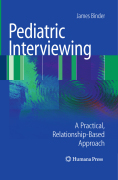
The evidence is extensive. Good communication has clear benefits for the clinician. Clinicians who interview well have a number of advantages, including the capability of gathering a full data base and of interviewing efficiently. Easy-to-read, compelling, and comprehensive in coverage, Pediatric Interviewing:A Practical, Relationship-Based Approach outlines effective strategies for interviewing parents and children efficiently. Topics covered include engaging patients and families, efficiently and smoothly obtaining a history of present illness and making a good differential diagnosis, uncovering hidden agendas, collaborative discussion in diagnosis and treatment, practicing family orientedcare, taking a full social history, and all other aspects of carrying out thepediatric interview. Offering clear, practical tips and a wide range of targeted case examples, this invaluable title emphasizes the importance of combining the biological and psychological aspects of patient care seamlessly. Most important, Pediatric Interviewing: A Practical, Relationship-Based Approach is based on relationship theory, the underlying foundation of successful clinical interviewing and a major determinant of optimal diagnosis, treatment, and health outcomes. Pediatric Interviewing: A Practical, Relationship-Based Approach is an indispensable guide for all clinicians engaged in the care of children and adolescents. Comprehensive coverage for all issues regularly encountered byclinicians during the pediatric interview Easy-to-read and compelling case examples Based on relationship theory, the foundation of successful clinical interviewing Outlines strategies and provides a wide range of practical tips for producing a smooth, effective pediatric interview Emphasizes the importance ofcombining the biological and psychological aspects of patient care seamlessly INDICE: Foreword.- Preface.- Acknowledgments.- The Shut-Down Interview andRelationships.- The Medical Interview: The Opening Phase,Talking with children.- History of Present Illness.- Discussing Diagnosis and Treatment with Families during the Concluding Phase of the Interview.- Assessment of Family Functioning/Talking to Families.- The Well-Child Visit.- Primary Care and Child Mental Health.- Sensitive Topics: Suicidality, Child Abuse, Sexuality, Substance Abuse.- Supporting Families Expressing Grief while Giving Bad News.- Challenging Patients.- Wandering Interviews.- Using Experiential Techniques to Teach Interviewing Skills.- Glossary of Terms.- Appendices.
- ISBN: 978-1-60761-255-1
- Editorial: Humana
- Encuadernacion: Rústica
- Páginas: 188
- Fecha Publicación: 01/02/2010
- Nº Volúmenes: 1
- Idioma: Inglés
